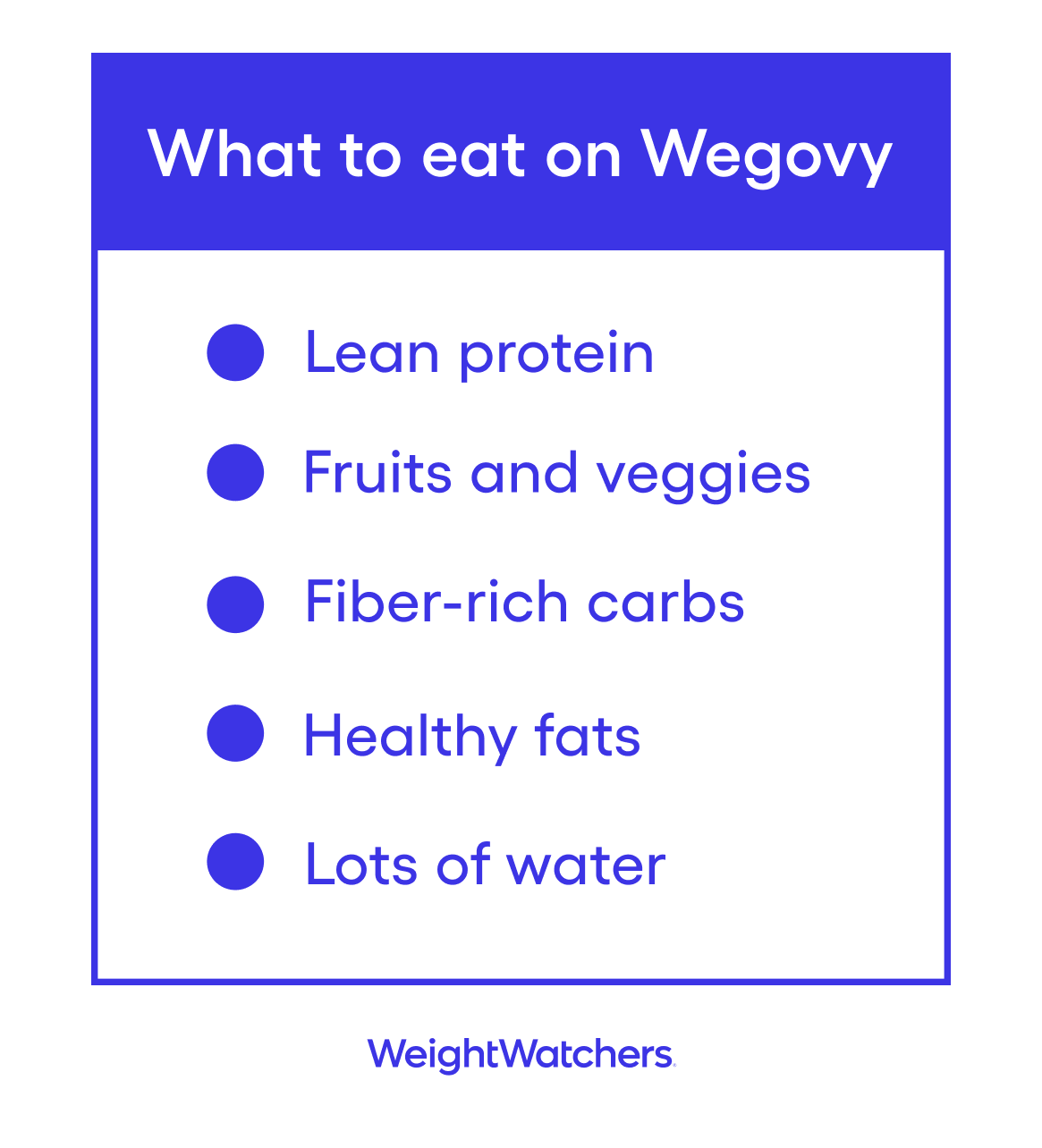What is the best diet to follow while taking Wegovy?


This article was originally written by the Sequence clinic team (now known as WeightWatchers Clinic).
In this article:
2/ How Wegovy works for weight loss
This article was originally written by the Sequence clinic team (now known as WeightWatchers Clinic).
The weight-loss world is full of red flags. Programs that eschew entire food groups. Diets that promise overnight results. The notion that you can just eat whatever? That’s wrapped in caution tape too, even when it comes to next-gen weight-loss medication like Wegovy. Here’s why what you eat on Wegovy matters a lot — plus the best diet to follow for weight loss and overall health.
What is Wegovy?
Wegovy is the brand name for the injectable weight-loss medication semaglutide, approved by the FDA for obesity treatment in June 2021 and available only via prescription. Part of a class of medications known as GLP-1 agonists, it mimics glucagon-like peptide-1 (GLP-1), a hormone that occurs naturally in the body and can impact weight in a number of ways.
How does Wegovy help you lose weight?
Wegovy works by affecting several key mechanisms in the body to help with weight loss, including appetite regulation, delayed gastric emptying, and blood sugar control:
- Appetite regulation
Wegovy mimics the effects of GLP-1, leading to reduced feelings of hunger and increased feelings of fullness. This can help you eat less and manage your caloric intake. - Delayed gastric emptying
Wegovy slows how quickly the stomach empties after a meal, which can contribute to feelings of satiety. This effect can help you feel fuller for longer after eating, and reduce the frequency and quantity of meals and snacks as a result. - Blood sugar control
Our bodies have a certain set of hormones — including glucagon-like-peptide-1 — that help regulate blood sugar levels. GLP-1 medications like Wegovy help those hormones do their job more effectively, improving blood sugar and supporting weight loss. This is why GLP-1s are also beneficial for individuals living with prediabetes and type 2 diabetes. In fact, it’s why they were initially developed.
How much weight can you lose with Wegovy?
Everyone responds differently to GLP-1 medications like Wegovy, but research shows, on average, it can produce significant results. In a large clinical trial published in the New England Journal of Medicine, adults with overweight or obesity lost an average of 15% of their body weight (an average of 33 pounds) in a year. Participants in the study were also living with a weight-related condition like high blood pressure (but not diabetes).
It’s also important to note that, in addition to taking weekly doses of semaglutide, participants made lifestyle changes.
What is the best diet to follow while on Wegovy?
Focusing on a healthy and balanced diet while taking Wegovy is important for a number of reasons. Primarily, building sustainable nutrition habits helps set the stage for weight management over the long term, medication or not. But it’s also key for optimizing its efficacy and managing medication-related side effects (visit the manufacturer’s website for the full list of Wegovy side effects).
While there is no one suggested “diet” for Wegovy, here are some guidelines on what to eat:
- Lean protein: Include lean sources of protein like chicken, turkey, fish, tofu, beans, and legumes in your diet. Aim for at least 1-1.2 grams of protein for every 2.2 pounds you weigh. Protein helps you feel full and satisfied and helps to prevent the muscle loss that can occur when you lose weight quickly.
- Fruits and vegetables: Incorporate plenty of fruits and vegetables into your meals. We recommend these foods make up half of your plate and that you aim for at least five servings per day. They are low in calories but packed with fiber and antioxidants. Since you’re likely eating less on Wegovy, it’s important to pack in such nutrient-rich foods wherever possible.
- Fiber-rich carbohydrates: Complex carbohydrates are rich in fiber, which means that they not only provide the body energy, but help to keep us satisfied for longer, too. Choose fiber-rich options such as starchy vegetables (potatoes of any kind, squash, and beets), beans and legumes (black beans, chickpeas, lentils, peas, and corn), fruit (berries, apples, and bananas), and whole grains (brown rice, quinoa, whole wheat bread, and oats). Since fiber helps with regularity, it can also help minimize constipation, a common side effect on GLP-1s like Wegovy.
- Healthy fats: Opt for sources of healthy fats such as avocados, nuts, seeds, and olive oil in moderation. We often refer to fat as the “invisible macronutrient” because oftentimes it's included in cooking methods such as roasting, searing, and sautéing. Healthy fats pack a lot of nutrition in a small amount, so be mindful of serving sizes. If you’re having unwanted side effects like nausea or vomiting, you may want to decrease fat consumption for a period of time to see if it helps your symptoms.
- Lots of water: Stay hydrated by drinking plenty of water throughout the day. The recommended fluid intake is at least 72 oz for women and 100 oz for men. Hydration is also important for mitigating unwanted side effects.

It’s not just about what makes up your plate, though. Here are some other nutrition habits to consider:
- Prioritize eating enough: Contrary to popular belief, the goal of weight-loss medications is not total appetite suppression or to eat as little as possible. Prioritizing adequate nutrition to meet your body’s needs not only supports your overall health, it also protects your metabolism, can limit side effects like muscle loss, and ensures your eating patterns are sustainable.
- Limit foods high in sugar or fat: Be mindful of your intake of sugary beverages and sweets, ultra-processed foods, and greasy or fried foods. These can cause gastrointestinal discomfort, particularly when you’re taking a weight-loss medication like Wegovy, and may limit progress by impeding the ability to get enough of the necessary nutrients like protein and fiber.
- Consume regular meals and snacks: Eating regular meals and snacks — roughly every 3 hours — can help maintain stable blood sugar levels and prevent overeating. Avoid skipping meals, which can lead to excessive hunger and less desirable food choices.
- Engage in mindful eating: Practice mindful eating by listening to your body's hunger and fullness cues. Eat slowly, savor your food, and avoid distractions like TV or smartphones during meals.
- Intentionally incorporate the foods you love: We’ll never tell you any food is “off limits.” For the sake of sustainability, it’s important to give yourself permission to eat for pleasure and not over-restrict the foods you enjoy!
- Be patient but persistent: Weight management takes time and consistent effort. Be patient with yourself and stay committed to your healthy eating and lifestyle changes.
Remember, these are general nutrition considerations to keep in mind while you are on a GLP-1 medication. If you start a GLP-1 medication and are a Weight Watchers Clinic member, follow the GLP-1 Program — it has nutrition advice like this built in. For additional support, schedule time to meet with one of WeightWatchers’ Registered Dietitians; they can provide more personalized guidance based on your specific health needs and goals.
Bottom line
Wegovy (semaglutide) is a GLP-1 medication that is FDA-approved for individuals living with obesity or overweight. But Wegovy isn’t a standalone solution for weight loss — it should be used as part of a comprehensive weight-loss program that includes increased physical activity, regular medical monitoring, and a balanced diet. Filling up with foods that are rich in nutrients can not only support your weight loss efforts over the long run, but also help minimize certain gastrointestinal side effects that are common with GLP-1s. Just make sure you stay in lockstep with your healthcare provider.
This content is for informational purposes only and does not constitute medical advice, diagnosis or treatment. It should not be regarded as a substitute for guidance from your healthcare provider.
Average weight loss with Wegovy over two years: Nature Medicine. (2022) "Two-year effects of semaglutide in adults with overweight or obesity: the STEP 5 trial." https://www.nature.com/articles/s41591-022-02026-4
Foods to avoid: Taylor & Francis Online (2021). “Managing the gastrointestinal side effects of GLP-1 receptor agonists in obesity: recommendations for clinical practice.” https://www.tandfonline.com/doi/full/10.1080/00325481.2021.2002616
Incidence of semaglutide side effects: Frontiers in Public Health. (2022) "Gastrointestinal adverse events associated with semaglutide: A pharmacovigilance study based on FDA adverse event reporting system."https://www.ncbi.nlm.nih.gov/pmc/articles/PMC9631444/
Regular hydration: Postgraduate Medicine. (2021) "Managing the gastrointestinal side effects of GLP-1 receptor agonists in obesity: recommendations for clinical practice." https://www.tandfonline.com/doi/pdf/10.1080/00325481.2021.2002616
Lower preference for fatty foods: Diabetes, Obesity & Metabolism. (2017) "Effects of once‐weekly semaglutide on appetite, energy intake, control of eating, food preference and body weight in subjects with obesity." https://www.ncbi.nlm.nih.gov/pmc/articles/PMC5573908/
